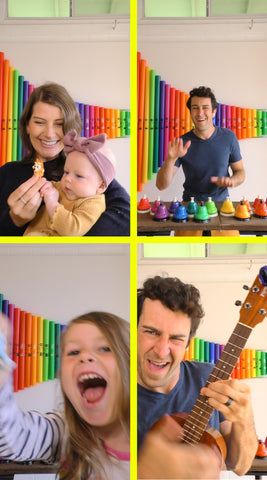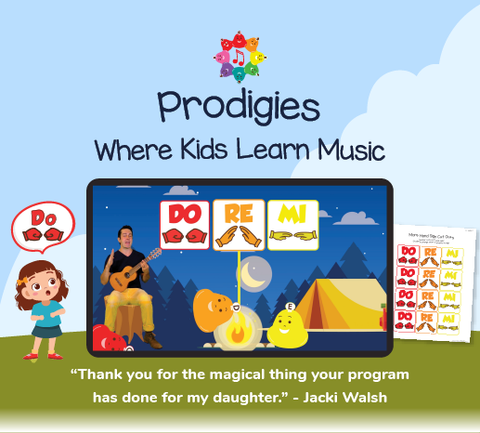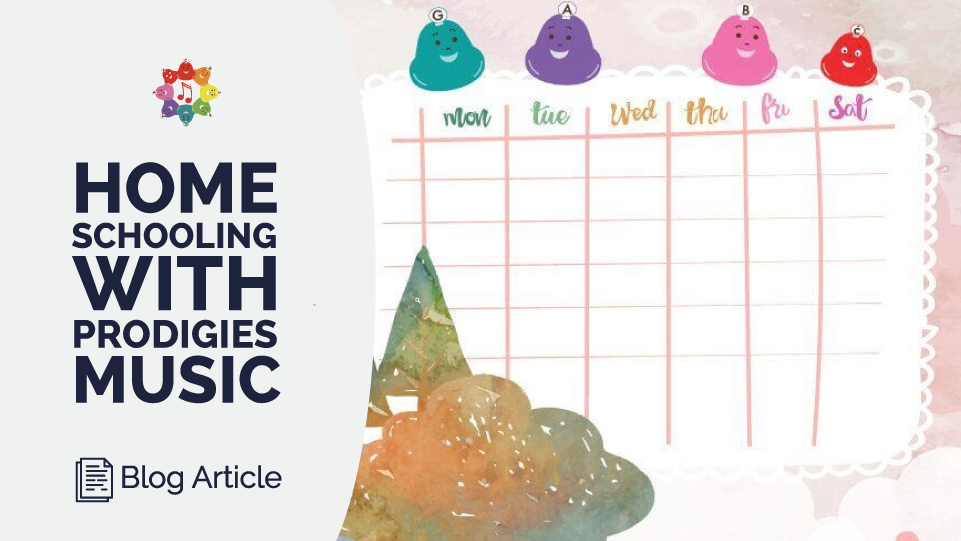Homeschooling with Prodigies
We get a lot of questions here at Prodigies about using our program in a home school setting, so if you’ve ever wondered about using Prodigies in your home school, then hopefully this short guide/FAQ will help you out!
What is Prodigies Music Lessons?
Prodigies is a video curriculum that will have your kids singing, hand signing and playing their way to a music education in no time.
The video music lessons inside the app feature Mr. Rob and a colorful cast of musical characters that focuses meaningful exposure to pitch, on singing in tune, and on learning your first musical instrument. The program is revolutionizing how children learn music, especially during early childhood, and it’s perfect as a homeschool music curriculum.

The instrument we start with is a colorful set of Deskbells that are durable and super easy to play. The durable and in-tune nature of the bells makes them a great starting instrument. Plus, the colors of the bells make everything a lot more self-correcting and the individual nature of the bells allows you focus on just the notes you’ll need for a given song.
The video lessons walk children through playing simple songs about colors, numbers and letters, as well as early childhood classics and Prodigies originals. Each song (or section) also comes with printable sheet music and 3-4 follow up activities to complete in your Workbooks. By the end of Chapter 1, your homeschooler will…
- Sing Solfege to Develop Pitch & Singing Skills
- Read & Play Colorful & Iconic Sheet Music
- Build Confidence by Playing their First Instrument
- Learn to Play & Perform Basic Rhythms
- Develop Pitch & Aural Skills with the Solfège Hand-Signs
- Read & Play Music in the Treble Clef
Prodigies is a fun, colorful and powerful music education solution, and you can learn more about the curriculum here.
From Our Family to Yours

As a family considering using the program, it’s nice to know that the Prodigies playground is produced and operated by a small family company. Host and principal creator Rob Young, and his long-time buddy Jeff Sedwick, started making green screen videos back in high school, and many years later, they reunited to combine their video production skills with Robs experience as a music teacher to pilot the first ever Prodigies lesson, Sweet Beets.
Sam, Rob’s wife quickly joined up and brought her skills as a teacher, administrator and curriculum developer to the team. The trio created the Prodigies together and launched a fun little YouTube project into a full-fledged business.
Now, the team has grown into a 10 person team to bring your homeschool thousands of music curriculum solutions from videos, workbooks, instruments, lesson plans and pdf resources.
This means that the team is nimble, constantly innovating and also very receptive to customer feedback. Plus, when you email or phone our office, chances are that you’ll be talking to an owner of the company or his brother Bryan (aka Meteor Man), which is pretty cool.
As small business owners, we are on a constant mission to improve and satisfy families and teachers looking for quality and modern music curriculum.
With that in mind, Prodigies comes from our family to yours, and we whole-heartedly believe that your kids will love the program!
What age(s) are appropriate for Prodigies?

The most common question we get from homeschooling families goes something like…
“Hi! I have a 2 year old and a 6 year old. Can I use the program for both children?”
For starters, yes! You can, absolutely use our program with multiple children. Getting multiple children working together on the program has a lot of benefits, such as positive social pressure, being able to play songs as duets, and of course just having a friend or a sibling to share the experience with just makes it more fun.
As far as the actual levels and age range is concerned, Prodigies began as a Preschool program and has developed into a full music curriculum for kids is ages 0-12 years old (even kids as old as highschool use our program!)

How Many Instruments Should I Get?

As a general rule of thumb, each child really needs their own set of bells (or a piano or a xylophone) to really take advantage of the program. Having your own instrument means that no matter song you’re playing in the program, you have the tools to participate 100% of the time.
You can of course split up the bells amongst two kids (or even three kids), and there are a select few lessons where we recommend this (like a duet). However, you need to be careful not to introduce notes that aren’t featured in a given section, simply because you wanted more bells for your kids to play with.
So for instance, playing the very first, “Hello C” only requires on bell, the C bell. We’ve seen parent submitted footage however of giving other kids in the group different colored bells so they could play along, but that’s ignoring the pitch of the instrument and ultimately undoing the memorization of pitch that we’re trying to achieve.
A lot of homeschooling families get an assortment of instrument for their different age kids. For instance, having a two year old on the bells and a six year old on the piano, and possibly switching instruments every now and then for a slightly different experience.
It’s also worth noting that the program features easy-to-learn hand-signs, which can be used (at least partially) in place of an instrument.
Should I purchase the books or print them myself?

This one is kind of up to you and depends on your color-printing situation. If you have a good color printer, maybe wait to order the books until you know you love all the activities (which you can see in the PDFs from the Resources Page).
One of the best tools to lean into is our colorful workbooks and songbooks. All of the Prodigies books are colorful & kid-friendly companions to our video music lessons that will have your students playing, singing and reading music in no-time.
With a Prodigies membership, you gain access to all of our workbooks and songbooks as PDF downloads. And if you’re looking to use physical books with your kids, drop by the shop for a great selection of beginner to advanced music workbooks and songbooks.
Which Plan Should I purchase?

For homeschoolers, we almost always recommend Prodigies Lifetime. This means that you’ll…
- Never have to worry about subscription fees
- Be able to download all of the videos, workbooks and materials for offline access and continued use
- Have access to all the material we release in Primary, Playtime, Ukulele, Piano and Recorder Prodigies
But if Prodigies Lifetime is not for you, we have monthly & yearly subscription options, as well as Kits that include the colorful deskbells and/or books.
Shop Prodigies Plans
Are there any spiritual songs or worship songs in the Prodigies Playground?
Find our Gospel Songbook in our shop! While Prodigies is a secular program, we have plenty of spiritual songs within our streaming app for your child to play along with, like Come By Here (Kumbaya) , Christ the Lord Has Risen Today & Shabbat Shalom!
What Kind of Parent Guidance Comes with the Program?

No matter which membership you decide to invest in, every core lesson of our program comes with parent guidance for making the most out of each lesson.
You also get Lessons Plans to accompany the core material (for running group classes around the lessons) and you even get a handful of training videos that explain the philosophy, methods and some more advanced tips and tricks for making the most out of the program.

Each Prodigies Lesson Plan includes…
- An Overview of what the students will be learning
- An Objective to aim for that week
- An Activator activity to warm up the class
- A Core Lesson to focus on, including worksheets and sheet music to reinforce the lesson
- A Performance to play through as a group or as assigned homework
- A Summary prompt & review of the Lesson
- An Extension, or final activity (or homework) to end the class with.
See? The hard-part is done for you. It’s all right here! Your kids are on a clear path toward learning basic musicianship and real music theory. When you pop on a lesson or a performance track for the first time, you’ll quickly realize how simple it is to lead your children through the learning process!
Instead of feeling stuck in a formal teaching setting, you’ll have the freedom to work closely with your children one-on-one. You’ll be able to observe them closely and decide when it’s best to pause, explain, and revisit challenging parts. Plus, if you’re comfortable, you can lead them through songs with conducting and singing, and if not — all of the songs have Mr. Rob free versions as well! So, if you’re uncomfortable doing that, we’ve got you covered!
We want to make sure you have everything to teach your children music. Call 302-307-1997 or email support@legacy.prodigies.com and we’ll help you out!
Pacing the Program and the Benefits of Repetition

The pacing of our program varies greatly from child to child, but generally we recommend focusing on one to two videos per week, and repeating those lessons throughout the week. This adds up to about 1 Chapter per month for a total of 8+ months, which also works well over the course of one full school year.
This repetition, either at home, school or at homeschool, does several things.
For one, children enjoy repetition because it makes them feel confident and in-the-know, in a world where many things are still new and unknown.
The repetition also gives your child a chance to master the concepts in the video. For instance, the first time they watch the video, especially if they’re 1-3 years old, there’s a good chance they’ll be too mesmerized to actually follow along. Then, the second time through, they’ll probably feel ready to participate actively.
It’s important to understand that the videos are designed to give children consistent, repetitive and meaningful exposure to individual notes. Through this kind of exposure to musical notes, children can develop the amazing musical skill of perfect pitch.
It’s also super important to realize that this is not a video show for kids that you watch once and move on from. Most kids 3-5 are not going to master the concepts in one go round, and you really want to take advantage of your child’s critical window for auditory development and give them as much consistent and meaningful play with pitch as possible.
Our suggested pacing is partially based on the research from the Taneda method for absolute pitch, which discovered that it takes about 3 months for children to internalize the sound of a musical chord. With that in mind,Prodigies Level 1 introduces three chords, and should be completed in about 9 months (at top speed). The program introduces 3 major chords, and gives children ample time to hear, sing and play those chords before ever truly assessing if they have the sound of the chord memorized.
Of course, older children or children who really love the program may complete it much faster. That’s okay, IF your child is completing the “What Note Is It?” and “Chord Listening” segments and getting most of the assessments correct.
You can also revisit the same lessons on a new instrument (bells, xylophone or piano) which will provide a more holistic and well rounded music education while also building up your child’s motor skills and technical abilities on different types of instruments.
Want to try Prodigies?

Enroll Now
Prodigies is a streaming music program for kids. Whether you’re a parent at home with no musical background, or a music teacher with 20 years experience, Prodigies will help make teaching your kids music easier than ever.
Prodigies combines fun video lessons & songs with easy-to-play instruments (like bells, books, recorder & ukuleles).

